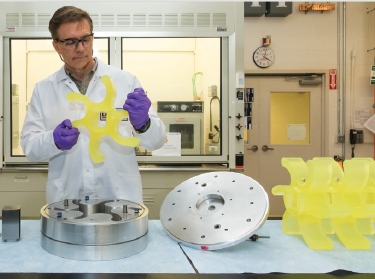LANXESS EVOLVES IN THE DIGITAL AGE
Like many sectors, the material science and specialty chemicals industries are in the midst of a digital transformation. By applying today’s technological capabilities, like machine learning and artificial intelligence (AI), companies are adding value and cutting costs.
 LANXESS, a global specialty chemical manufacturer with North American headquarters in Pittsburgh, is undergoing a companywide digital transformation along each point of the value chain. The initiative, launched in 2017, is aimed at developing digital business models, introducing new technologies along the value chain, developing and utilizing big data, and fostering digital expertise among employees.
LANXESS, a global specialty chemical manufacturer with North American headquarters in Pittsburgh, is undergoing a companywide digital transformation along each point of the value chain. The initiative, launched in 2017, is aimed at developing digital business models, introducing new technologies along the value chain, developing and utilizing big data, and fostering digital expertise among employees.
In addition to improved products and safer processes, LANXESS hopes the digitalization process can also lead to less raw material waste, improved logistics, and more efficient energy usage, all helping the company meet its previously-announced commitment to become climate neutral by 2040.
Digitizing a Global Asset Base
As LANXESS works to digitize its production, the company recently announced the implementation of a self-service analytics system – called TrendMiner – to acquire real time data at most of its 120 plants worldwide. The company’s production employees are using the software to autonomously analyze manufacturing processes and measurement data and also detect patterns and trends in the data. The software allows LANXESS to quickly identify production irregularities and predictive maintenance.
The software has already proven worthwhile for LANXESS, as the company is seeing increased capacity, optimized resource efficiency, and even reduced maintenance costs – providing the company with six-figure savings across the initial projects.
Using Artificial Intelligence
In 2019, LANXESS announced plans to broaden its use of AI in product development through a partnership with Citrine Informatics, a California-based company that also has an office in Pittsburgh and has collaborated with Carnegie Mellon University.
Citrine, recognized as a leader in data usage and AI, is working with LANXESS’ Urethane Systems business unit to develop tailor-made prepolymer products. At the company’s research and development facilities in Naugatuck, Connecticut, data specialists and process experts are using the Citrine Platform to add data points to the company’s already vast formulation database. The artificial intelligence process greatly reduces the time in optimizing formulations.
LANXESS and Citrine previously partnered on a pilot project to enhance glass fibers and further improve the effectiveness of high performance plastics. AI is anticipated to cut development times for those formulations by more than half, while also providing better products.
While chemists have largely relied on their expertise and experience in researching defined product characteristics, such as hardness, tensile strength and viscosity, AI now is becoming an important tool to broaden the knowledge of these characteristics, and significantly reduce the required tests - therefore saving time and money.
The use of digital technologies is increasingly becoming standard procedure at LANXESS.